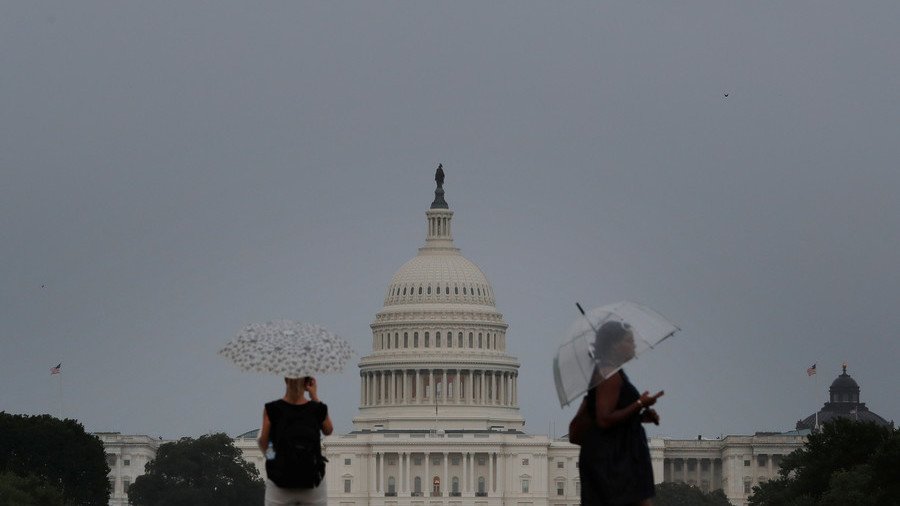US Congress publishes entire text of Russia sanctions ‘bill from hell’

The full text of Congress’ latest sanctions bill has been released, revealing a punitive piece of legislation that aims to undermine Russia economically – and even suggests designating Moscow a state sponsor of terrorism.
Dubbed the “sanctions bill from hell” by its authors, the ‘Defending American Security from Kremlin Aggression Act of 2018’ was introduced by a group of Republican and Democratic senators on August 2. The bill would place restrictions on US cooperation with Russia’s oil industry, target Russian sovereign debt transactions as well as Russian uranium imports. In addition, the legislation calls for sanctions against “political figures, oligarchs, and other persons that facilitate illicit and corrupt activities, directly or indirectly, on behalf of the President of the Russian Federation, Vladimir Putin.”
The bill, which was recently published in full on Congress’ official website, also pledges full support for NATO and would require a two-thirds majority vote in the Senate if the United States ever wishes to exit the transatlantic alliance.
The legislation also declares that “the United States will never recognize the illegal annexation of Crimea by the Russian Federation” and that Washington, in conjunction with NATO, should “prioritize efforts to prevent the further consolidation of illegal occupying powers in Crimea.”
The pending ‘Kremlin Aggression Act’ decrees that Congress should also determine whether Russia “meets the criteria for designation as a state sponsor of terrorism.”
The bill also accused Russia of “enabling the brutal regime of Bashar al-Assad in Syria to commit war crimes,” adding that Moscow has shown itself to be “incapable or unwilling” to compel Assad to “stop using chemical weapons against the civilian population in Syria.”
The Act calls for a congressional committee to investigate “alleged war crimes and crimes against humanity attributable to [Russia]” and resolves to “punish the Government of the Russian Federation for, and deter that Government from, any chemical weapons production and use through the imposition of sanctions, diplomatic isolation, and the use of the mechanisms specified in the Chemical Weapons Convention for violations of the Convention.”
The legislation is just the latest addition to a laundry list of sanctions and laws passed in the months following the 2016 presidential election.
READ MORE: Snr Russian senator likens US sanctions plan to police torture for confession
Republican hawk Lindsey Graham (South Carolina) and Bob Menendez (D-New Jersey), who both sponsored the bill, said in a joint statement that the legislation is designed to show that the US will “not waver in our rejection of [Russian President Vladimir Putin’s] effort to erode western democracy as a strategic imperative for Russia’s future.” The Russia-obsessed Senator John McCain (R-Arizona) was one of the five co-sponsors of the bill.
Moscow has brushed off the new wave of accusations as a projection of internal US struggle. Some elements in the US government are trying to “keep afloat” the conspiracy that Russia meddled in the US elections, in hopes of derailing constructive relations with Moscow and using the issue “purely for internal American purposes,” Senator Konstantin Kosachev, who chairs the Upper House Committee for International Relations, has said in response to the latest sanctions.
#Graham & #Menendez team up for bipartisan anti-Russia bill https://t.co/Y7dXWpy314
— RT (@RT_com) July 24, 2018
Prime Minister Dmitry Medvedev has warned that the adoption of any US legislation that targets Russian banking operations and currency trade would be considered a declaration of economic war.
“If they introduce something like a ban on banking operations or the use of any currency, we will treat it as a declaration of economic war. And we’ll have to respond to it accordingly – economically, politically, or in any other way, if required,” Medvedev said last week. "Our American friends should make no mistake about it.”
Moscow has vowed to respond to any new sanctions. Russia’s Finance Ministry said it would continue to sell off its holdings of US Treasury securities, while some lawmakers have called for Russia and its allies to stop using the US dollar for mutual payments.
If you like this story, share it with a friend!
















